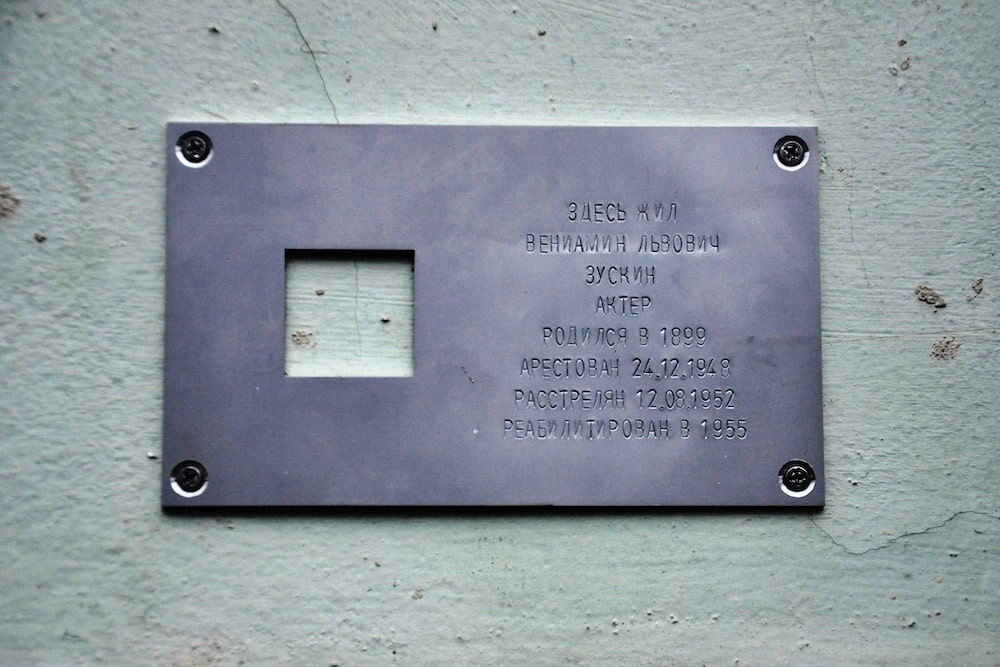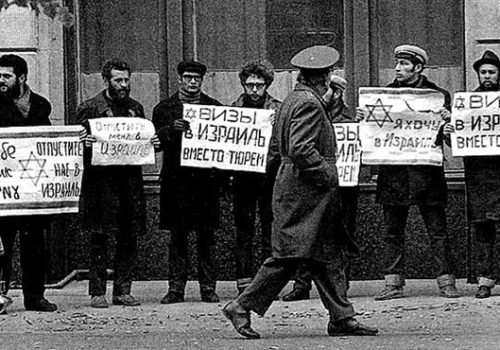- 15/08/2021

JAC was a striking phenomenon of the Soviet era and became one of the most tragic pages in the history of the Soviet Jews.
This year marks the 80th anniversary of the founding of the Jewish Anti-Fascist Committee (JAC). And in 1952, its Jewish intellectual leaders were executed.
The idea of dual loyalty – disloyalty or incomplete loyalty to the regime and society of the country – is one of the most widespread antisemitic stereotypes of modern times. It implies that the Jew is always on the side of the State of Israel or the Jewish people, regardless of their present residence.
A 2014 report by the Anti-Defamation League found that the false accusation of dual loyalty is the main international antisemitic stereotype.
“If the interests of Israel are opposed to those of the country where a Jew lives, an antisemite can accuse the Jewish citizen of siding with the Israeli interest – saying, actually, ‘you are not really one of us.’ In its most extreme form, the charge of dual loyalty amounts to an accusation of treason,” said Dr. Manfred Gerstenfeld.
JAC was a striking phenomenon of the Soviet era and became one of the most tragic pages in the history of the Soviet Jews.
It was created in 1941 by the authorities as a propaganda tool.
The goal was to form a public opinion of the USSR in the anti-Hitler coalition countries and to organize a campaign to raise funds for the needs of the Red Army in the Jewish communities of the Western world. The most prominent figure of Soviet Jewish culture, Solomon Mikhoels, was invited to be the head of the JAC.
The JAC activity was quite successful.
The Pravda newspaper informed about the decision made at a special conference by the American Jewish Joint Distribution Committee in Chicago “to finance a thousand ambulances for the needs of the Red Army.”
Mikhoels himself was seen as a representative of Soviet Jewry both inside the USSR and outside the country. It is well known that under his leadership, the JAC became the place where Soviet Jews could appeal for help, protection and support, and share their aspirations and plans.
However, it went beyond the functions, determined by the authorities and personally by the Soviet leader Joseph Stalin, to function exclusively for the benefit of the communist regime.
The leaders of the committee fully accepted the established rules and demonstrated their loyalty to the regime in every possible way. So, the very name of the official publication of the JAC – “Einikite” or “Unity” – was explained as “the unity of Soviet patriots writing ‘in Jewish.’”
Considering the success of its members in fulfilling the tasks entrusted to them, the authorities put up with the fact that the committee was acquiring a slightly different function for some time.
The situation changed with the end of World War II and especially right before the creation of the State of Israel in 1948.
In the fall of 1946, the head of the party’s foreign policy department, M. Suslov, noted, “The well-known positive role played by the JAC during the Great Patriotic War … contribut[ed] to some extent to the mobilization of the Jewish population abroad to fight German fascism … but with the end of the war, the positive role of the committee turned out to be exhausted and … [became] politically harmful.”
The decision to liquidate the JAC was only a matter of circumstances and time.
In January 1948, Mikhoels was brutally murdered – strangled and then crushed by a truck.
Then, in 1948, the Minister of State Security of the USSR Viktor Abakumov introduced an extensive document on the activities of the JAC to Stalin, Former Minister of Foreign Affairs of Soviet Union Vyacheslav Molotov and Former Second Secretary of the Communist Party of the Soviet Union Andrei Zhdanov. According to these documents, Mikhoels, as well as poets Itzik Fefer, Peretz Markish, Lev Kvitko, writer David Bergelson and other members of the JAC, were declared as “active nationalists” who were “focusing on the Americans, in essence, carrying out anti-Soviet nationalist work.”
The document mentioned “the American and British spies exposed among them” who “being hostile against the Soviet system, carried out subversive work.”
When the communist establishment got the idea of dual loyalty solely as disloyalty to the Soviet regime and an encroachment on the regime’s ideological monopoly, the fate of the JAC members was a foregone conclusion. Its leaders were arrested, tortured and shot.
On August 12, 1952, a large group of its most prominent members were killed by the death penalty.
Prof. Lina Stern, the first female academician in the USSR, was sentenced to imprisonment for three and a half years, followed by five years of exile. The Deputy Minister of Control of the USSR Solomon Bregman died of “a decline in heart activity.”
The charges against the members of the JAC were preposterous.
The Jewish theater actor Benjamin Zuskin was sentenced to death for “staging plays in the theater that glorified Jewish antiquity, shtetl traditions and life and the tragic doom of Jews, which aroused nationalistic feelings in Jewish spectators.”
The journalist and the literary critic M. Eisenstadt was killed for publishing the lists of 135 Jewish Heroes of the Soviet Union, as well as collecting materials and writing 30 essays about some of them.
In a note she left to her husband and daughter, the journalist wrote: “The charges against me are monstrous. I will not sign anything, and that means we will never meet again.”
As Eisenstadt’s daughter recalled, “She did not sign anything, there are two sheets of paper in her file: an interrogation protocol and a death sentence.”
On January 28, 1948 an article in the Pravda used the terms “rootless cosmopolitan” and “bourgeois nationalist”, which became the definitions of Jews and a call to destroy the remnants of Jewish culture in the USSR.
During the years of the Khrushchev’s Thaw and the partial de-Stalinization of the Soviet regime, the victims and survivors of the JAC case and other post-war antisemitic campaigns were rehabilitated. The ideological and political tone set at the end of the Stalinist era lasted for another four decades.
Suspicions and accusations of “double loyalty” against Soviet Jews were common and prohibition on professions, restrictions to travel abroad, discrimination in enrollment part of the every day life of the Jews until the very end of the Soviet era.
Dr. Haim Ben Yakov, Director General of the Euro-Asian Jewish Congress



